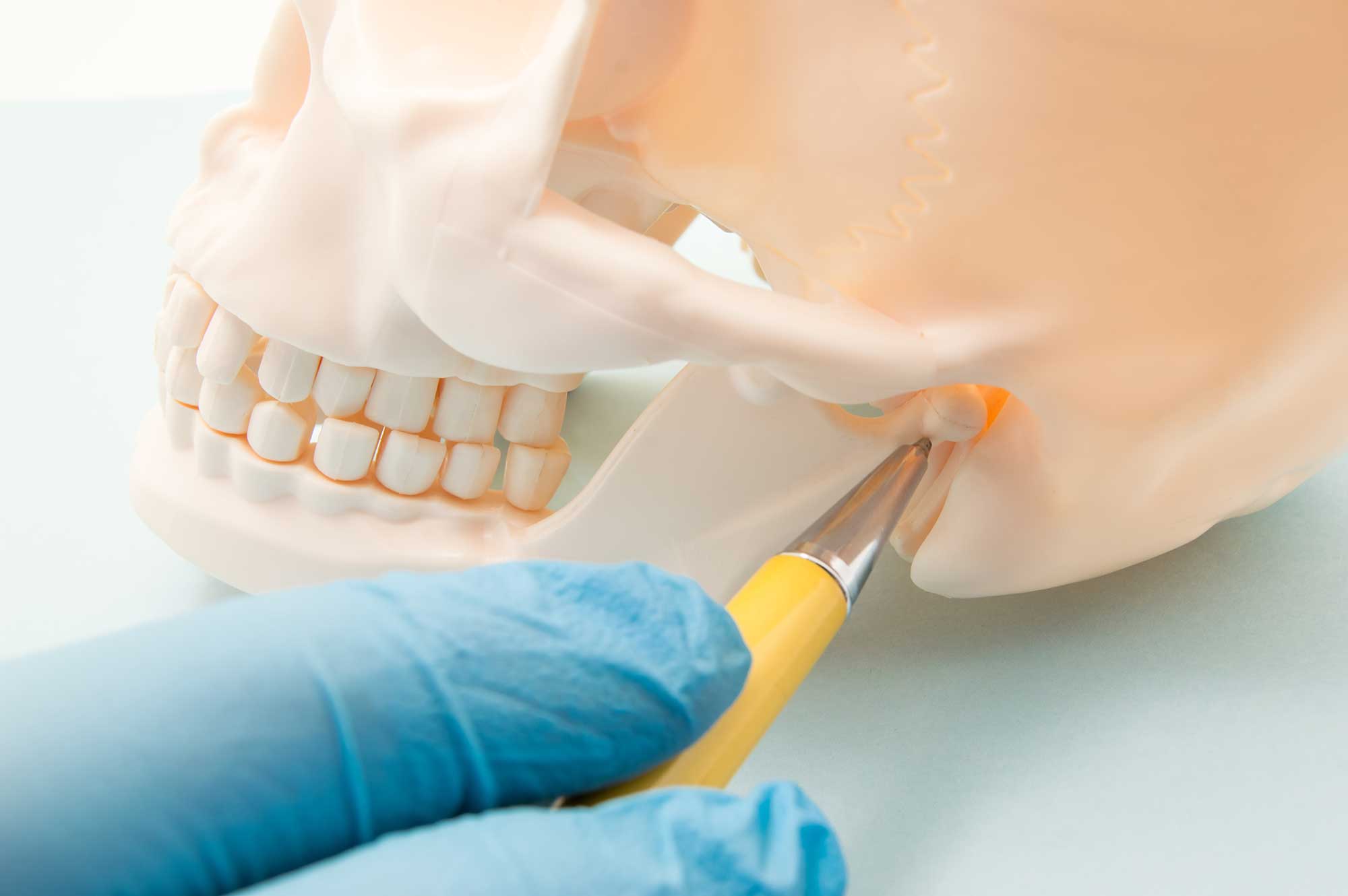Temporomandibular joint disorder is general term used to describe pain, stiffness or other symptoms caused by problems with the muscles, bones and joint components that allow for jaw movement. These problems can affect daily activities such as chewing, speaking and swallowing, making treatment important for overall health and well-being.
What are the Causes of Temporomandibular Joint Disorders?
Temporomandibular joint disorders can arise from a variety of different factors, including:
- Jaw joint injury
- Teeth clenching and grinding
- Stress
- Arthritis
- Dysfunctional occlusion (mismatch between upper and lower teeth or improper jaw position)
- Hormonal factors
- Genetic factors
What are the Symptoms of TMJ Disorders?
Common symptoms of TMJ disorders include:
- Jaw pain
- Jaw joint grinding and clicking
- Ear pain
- Jaw joint locking
- Limited jaw movements
- Headaches
- Tooth sensitivity
- Swelling in the face
TMJ symptoms can vary from person to person, so it is important to share them with a doctor in order to receive appropriate treatment.
How is Temporomandibular Joint Disorders (TMJ) Diagnosed?
Several different methods can be used to diagnose temporomandibular joint disorder. These methods include:
- Physical exam: A dentist or ear, nose and throat specialist can examine the jaw joint, jaw muscles and surrounding tissues to diagnose TMJ disorder.
- Imaging tests: Imaging tests such as X-rays, magnetic resonance imaging (MRI), or computed tomography (CT) scans can help to get a detailed view of the jaw joint and surrounding tissues.
- Jaw movement tests: Jaw movement tests help to evaluate symptoms such as jaw joint range of motion, grinding or clicking.
- Dental examination: A dental examination can help evaluate temporomandibular joint disorder symptoms such as limited jaw movement, teeth clenching and overuse of jaw muscles.
What is the Importance of Dentistry in TMJ Disorder?
Temporomandibular joint disorder is an important condition in dentistry because dental problems such as misalignment of teeth, overuse of teeth, teeth clenching or grinding can be among the causes of TMJ. Dentists can be primary treatment providers for TMJ symptoms.
A dentist can help reduce symptoms by addressing dental problems that cause TMJ symptoms, such as teeth misalignment and overuse. They can also design mouthguards for patients with symptoms such as teeth clenching or grinding, which can help reduce TMJ symptoms by reducing the tension in the jaw muscles.
During TMJ disorder treatment, dentists also pay attention to the health of the teeth. Some TMJ treatments are related to teeth alignment and reducing tension in the jaw muscles. Therefore, dentists take precautions to preserve the health of the teeth during the treatment process
How is Temporomandibular Joint Disorder Treated?
The treatment of temporomandibular joint disorder (TMJ) varies depending on the severity of symptoms, underlying causes and individual condition. The commonly used treatment methods are as follows:
- Mouthguards: In some patients, teeth grinding or night-time teeth clenching can exacerbate TMJ. Mouthguards can help alleviate symptoms in such cases.
- Soft foods: Recommended to reduce pressure on the jaw joint and alleviate symptoms.
- Pain relievers: Pain medication may be prescribed to alleviate TMJ disorder symptoms.
- Muscle relaxants: Muscle relaxants can help alleviate tension and spasms in the jaw muscles.
- Stress management: Stress can worsen TMJ symptoms, so stress management techniques can help alleviate symptoms.
- Physical therapy: Physical therapy is used to reduce tension in the jaw muscles and increase jaw joint mobility.
- Surgical treatment: When temporomandibular joint disorder is severe and other treatments are unsuccessful, surgical treatment may be necessary.
Frequently Asked Questions
Does TMJ Go Away on its Own?
TMJ problems may sometimes go away on their own without any treatment. However, in most cases, it requires examination and treatment by a specialist.
Which Doctor Should I See for TMJ?
Two dental specialties deal with this subject. These are TMJ joint specialists (often associated with the prosthesis department) and maxillofacial surgeons.
What Happens if TMJ is Left Untreated?
Untreated TMJ can progress. Initially, mild pain or clicking sounds may be experienced in front of the ear. However, as the condition progresses, severe pain when eating hard foods or restricted mouth opening in the morning may occur.
Does TMJ Cause Headaches?
Temporomandibular joint disorder can cause headaches. This pain often recurs in one or more areas of the head and face or may be felt like tension-type headaches.
